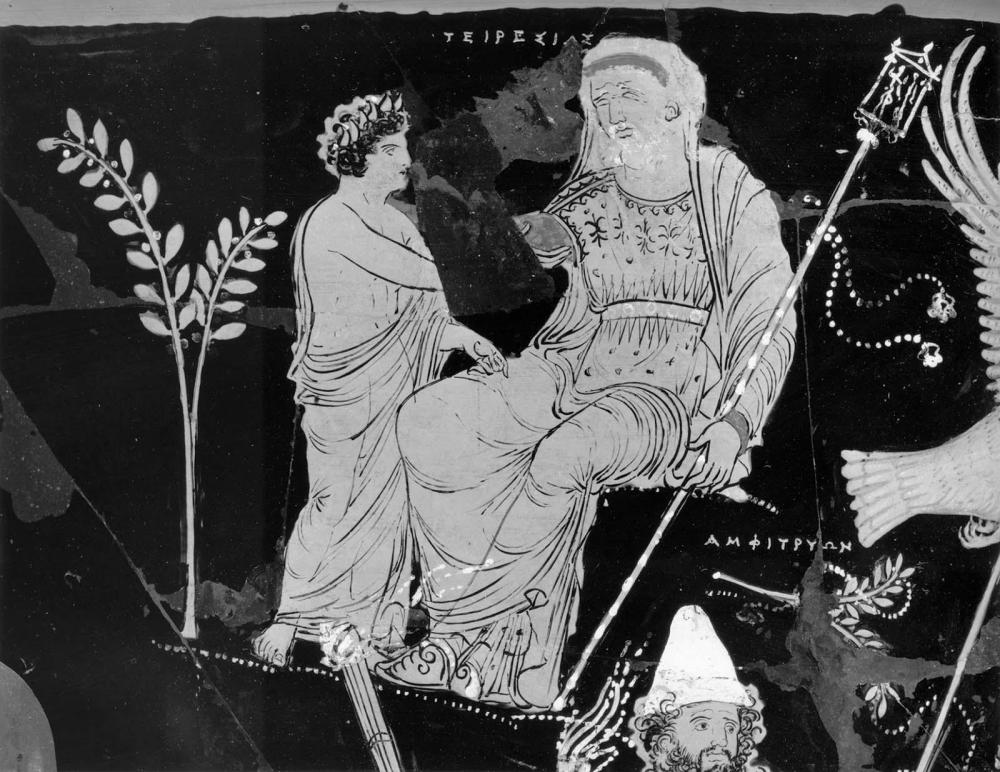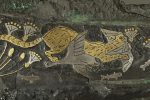Teiresias depicted on an Apulian Calyx Krater, attributed to the Darius Painter, 350-300 BC (Boston, Museum of Fine Arts).
While modern scepticism might label divination as superstition, in the ancient Greek world it was a serious and highly respected practice—particularly when political or military decisions were at stake. Seers were not mere fortune-tellers but trained professionals, embedded in social structures and consulted at pivotal moments. Their role reveals much about the Greek world-view, where divine will and human action were seen as interlinked.
Prophecy as a family business: the Iamidae of Olympia
Greek μάντεις (manteis, ‘seers’), were mostly respected and well-paid. A modern analogy might be the corporate strategy consultant: people in positions of leadership (businessmen, generals, and politicians, for example) regularly relied on input from a professional seer before taking important decisions. Ridicule and accusations of charlatanism came with the territory for individual seers, but on a societal level evidence of real scepticism is rare.
Several ‘clans’ of seers are known to us, most prominently the Iamidae at Olympia, who are mentioned by Pindar and Pausanias. We have evidence of their prophetic activities at Olympia from the 5th Century BCE up until the 3rd Century CE.
Tisamenus of Elis and the politics of prophecy
Herodotus tells us about the most well-documented Iamid, Tisamenus of Elis, during the Second Persian Invasion of Greece (480-479 BCE):
ὡς δὲ ἄρα πάντες οἱ ἐτετάχατο κατὰ ἔθνεα καὶ κατὰ τέλεα, ἐνθαῦτα τῇ δευτέρῃ ἐθύοντο καὶ ἀμφότεροι. Ἕλλησι μὲν Τισαμενὸς Ἀντιόχου ἦν ὁ θυόμενος: οὗτος γὰρ δὴ εἵπετο τῷ στρατεύματι τούτῳ μάντις: τὸν ἐόντα Ἠλεῖον καὶ γένεος τοῦ Ἰαμιδέων Κλυτιάδην Λακεδαιμόνιοι ἐποιήσαντο λεωσφέτερον. Τισαμενῷ γὰρ μαντευομένῳ ἐν Δελφοῖσι περὶ γόνου ἀνεῖλε ἡ Πυθίη ἀγῶνας τοὺς μεγίστους ἀναιρήσεσθαι πέντε. ὃ μὲν δὴ ἁμαρτὼν τοῦ χρηστηρίου προσεῖχε γυμνασίοισι ὡς ἀναιρησόμενος γυμνικοὺς ἀγῶνας, ἀσκέων δὲ πεντάεθλον παρὰ ἓν πάλαισμα ἔδραμε νικᾶν Ὀλυμπιάδα, Ἱερωνύμῳ τῷ Ἀνδρίῳ ἐλθὼν ἐς ἔριν. Λακεδαιμόνιοι δὲ μαθόντες οὐκ ἐς γυμνικοὺς ἀλλ᾽ ἐς ἀρηίους ἀγῶνας φέρον τὸ Τισαμενοῦ μαντήιον, μισθῷ ἐπειρῶντο πείσαντες Τισαμενὸν ποιέεσθαι ἅμα Ἡρακλειδέων τοῖσι βασιλεῦσι ἡγεμόνα τῶν πολέμων. ὁ δὲ ὁρέων περὶ πολλοῦ ποιευμένους Σπαρτιήτας φίλον αὐτὸν προσθέσθαι, μαθὼν τοῦτο ἀνετίμα, σημαίνων σφι ὡς ἤν μιν πολιήτην σφέτερον ποιήσωνται τῶν πάντων μεταδιδόντες, ποιήσει ταῦτα, ἐπ᾽ ἄλλῳ μισθῷ δ᾽ οὔ. Σπαρτιῆται δὲ πρῶτα μὲν ἀκούσαντες δεινὰ ἐποιεῦντο καὶ μετίεσαν τῆς χρησμοσύνης τὸ παράπαν, τέλος δὲ δείματος μεγάλου ἐπικρεμαμένου τοῦ Περσικοῦ τούτου στρατεύματος καταίνεον μετιόντες.
Herodotus, The Histories, 9.33
On the second day after they had all been arrayed according to their nations and their battalions, both armies offered sacrifice. It was Tisamenus who sacrificed for the Greeks, for he was with their army as a diviner; he was an Elean by birth, a Clytiad of the Iamid clan, and the Lacedaemonians gave him the freedom of their city. This they did, for when Tisamenus was inquiring of the oracle at Delphi concerning offspring, the priestess prophesied to him that he should win five great victories. Not understanding that oracle, he engaged in bodily exercise, thinking that he would then be able to win in similar sports. When he had trained himself for the Five Contests, he came within one wrestling bout of winning the Olympic prize, in a match with Hieronymus of Andros. The Lacedaemonians, however, perceived that the oracle given to Tisamenus spoke of the lists not of sport but of war, and they attempted to bribe Tisamenus to be a leader in their wars jointly with their kings of Heracles’ line. When he saw that the Spartans set great store by his friendship, he set his price higher, and made it known to them that he would do what they wanted only in exchange for the gift of full citizenship and all of the citizen’s rights. Hearing that, the Spartans at first were angry and completely abandoned their request; but when the dreadful menace of this Persian host hung over them, they consented and granted his demand.
(Trans. A. D. Godley, 1920)
What divination in Ancient Greece actually looked like
Divination in ancient Greece took many forms, ranging from the interpretation of omens in nature to complex ritual practices. A seer might examine the flight of birds (ornithomancy), the patterns of sacrificial entrails (haruspicy), or the behaviour of flames and smoke during ritual offerings.
Dreams, too, were believed to carry divine messages, especially when sought in sacred spaces like healing sanctuaries. While oracles such as Delphi operated through priestesses, independent manteis offered more mobile, personalised services, often accompanying armies or advising city officials. Understanding the vocabulary, rituals, and literary references tied to these practices offers rich insights into Greek thought, just one reason so many students today choose to learn Ancient Greek and engage with these texts in their original language.
The cultural legacy of Greek divination
Modern eyes might view Greek divination as quaint or irrational, but in its own time it was deeply integrated into public life and intellectual thought. Philosophers such as Socrates acknowledged divine signs, while playwrights explored the tension between prophecy and free will. Even sceptical thinkers rarely dismissed divination outright; instead, they questioned interpretations rather than the possibility of divine communication.
Over time, as philosophical rationalism gained ground and Roman practices took hold, traditional Greek forms of divination began to decline. Yet their legacy endures, not only in literature and historical records, but in our continued fascination with fate, foresight, and the boundaries of human knowledge.



